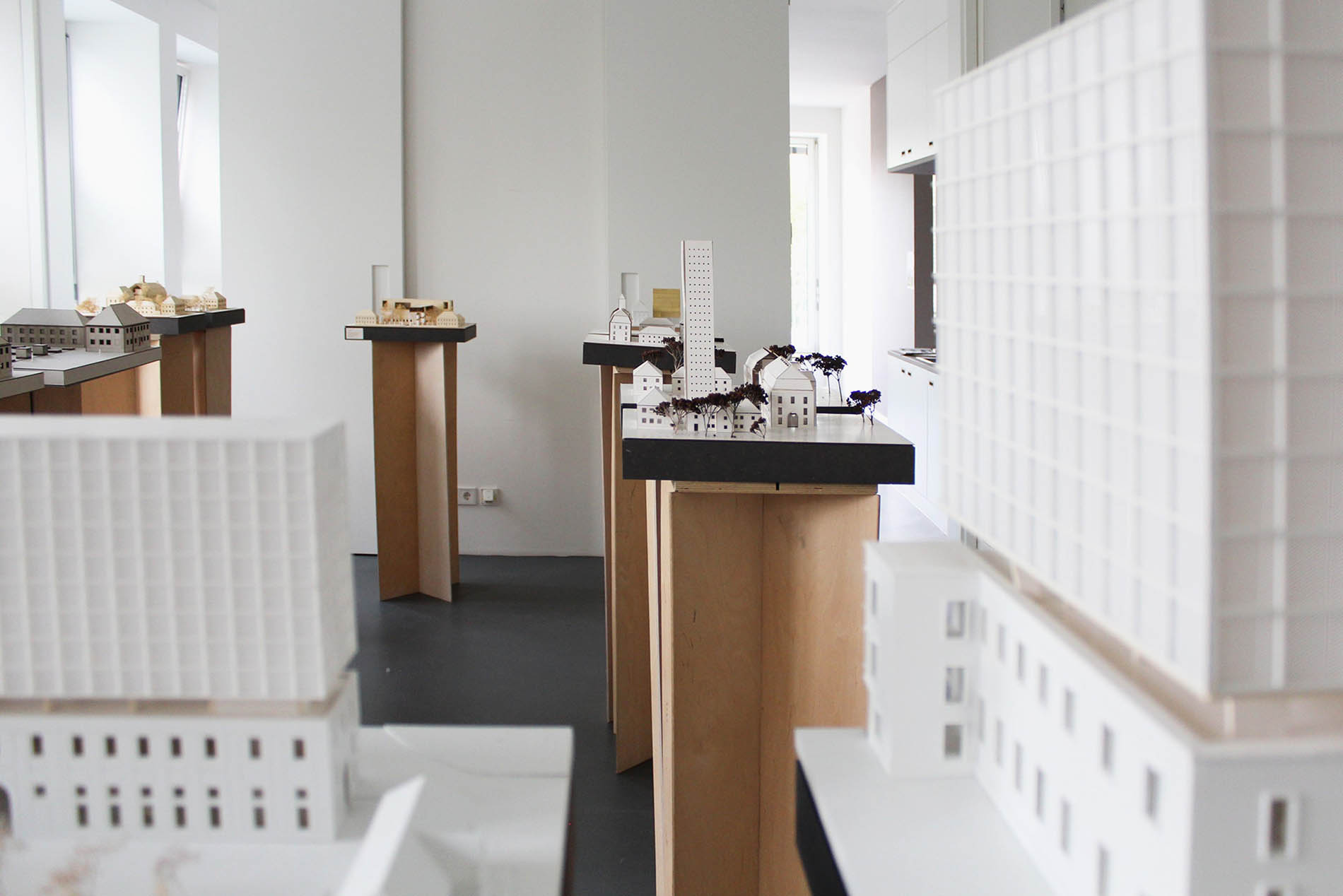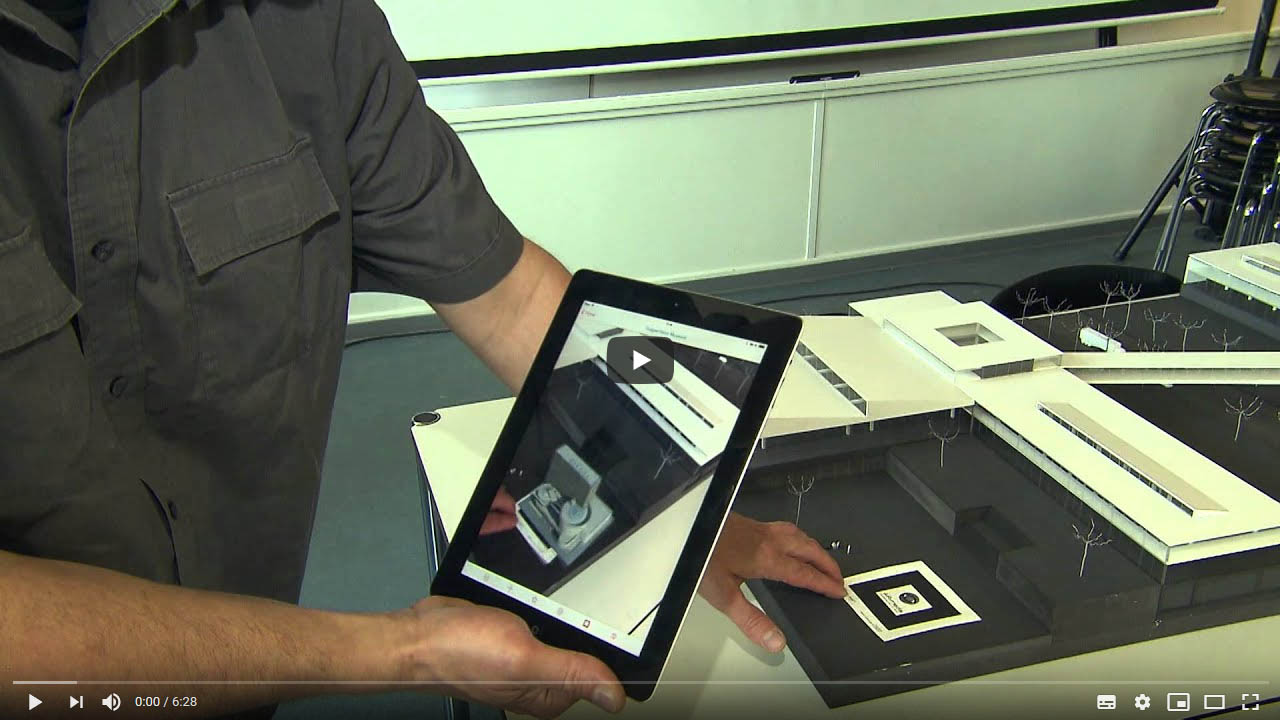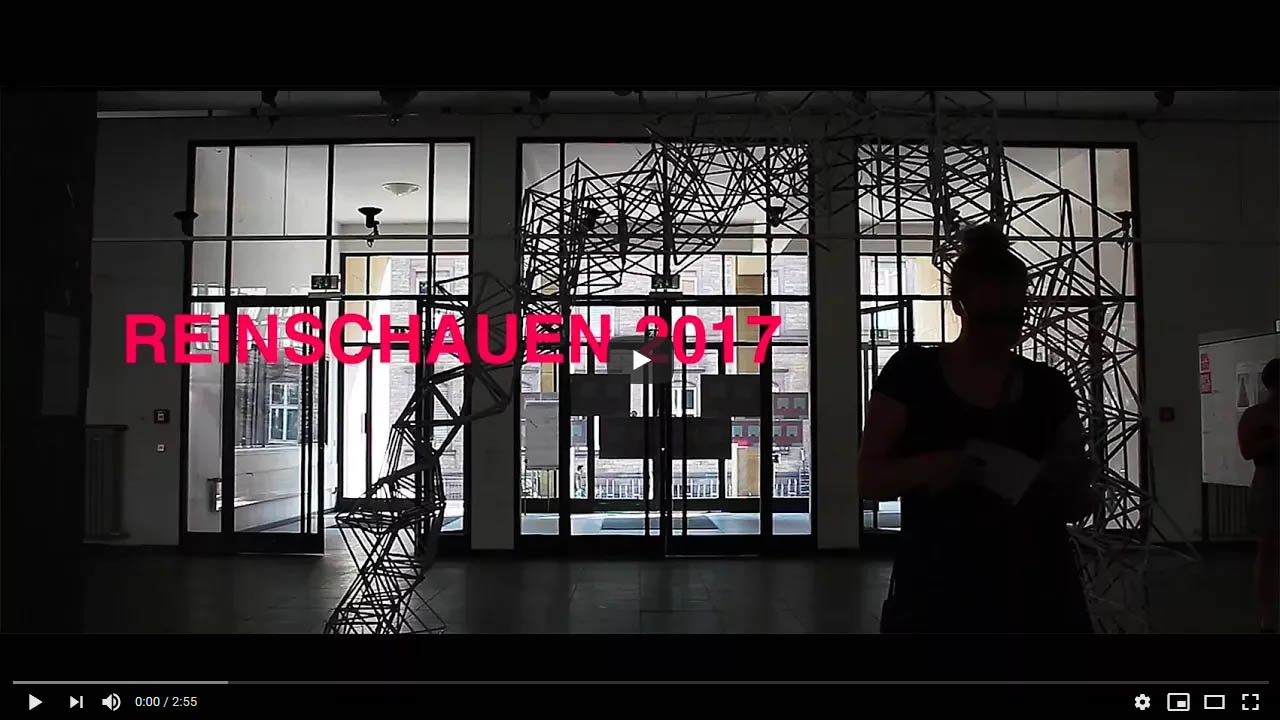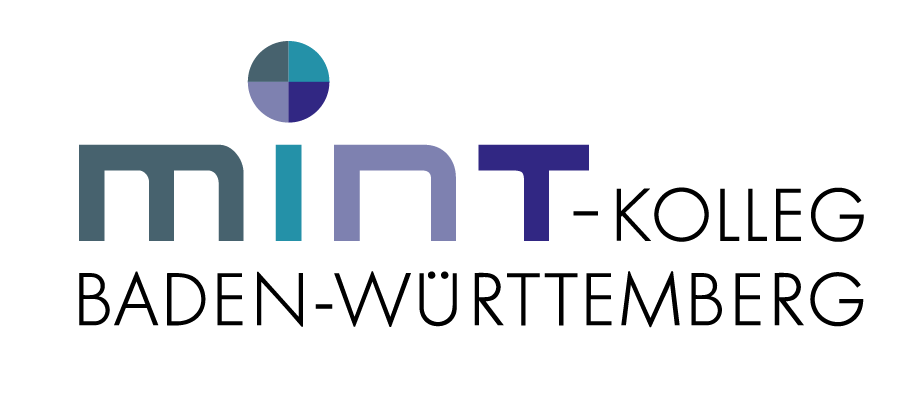Degree: Bachelor of Science (B.Sc.)
Regular program length: 6 semester (full-time program)
Credit points (ECTS): 180 credit points
Language of instruction: German
Higher semester: yes
Higher semester: winter and summer term
First semester: July 15
Higher semester: July 15 for winter term, January 15 for summer term
First semester: July 15
Higher semester: July 15 for winter term, January 15 for summer term
Program details
What is it all about?
"Using scientific methods to work on the creative design of the world - that is our goal as the Karlsruhe Department of Architecture at KIT."
In the bachelor's degree program in Architecture at KIT, you will deal with the design, creation and construction of buildings as well as the planning of urban and landscape spaces. You will acquire the in-depth specialist knowledge required for planning and implementation and develop a sound judgment of space and context, material and construction, history and theory, use and effects, management, economics and sustainability.
One focus of the program in terms of content and methodology is design theory, which you will deepen in so-called design studios with changing thematic focuses. This is accompanied by a coordinated range of basic courses in artistic, technical, historical and social science subjects. In the higher semesters, you have the opportunity to set your own priorities and deepen your knowledge in a targeted manner.
Program structure
During your studies, you have various subjects, which consist of one or more modules. A module deals with a specific topic and consists of one or more courses. In the module handbook for your degree program, you will find a description of the modules and their subject assignment as well as a study plan. This gives you an orientation as to which courses you should attend in which semester in order to complete your studies within the standard period of study. It takes into account a balanced distribution of courses over the individual semesters. It also ensures that you are first taught the important basics before moving on to more advanced topics. Your individual course of study may differ from this.
Your studies are divided into the following subjects:
- design: here you will learn the basics of architectural and urban design and deal with spatial, functional and design requirements.
- integral design: you will deal with interdisciplinary approaches and link design, technical and sustainability-related aspects in your design projects.
- building construction: this subject provides you with the necessary knowledge of construction, materials science, building physics and structural design.
- theoretical and historical foundations: you will explore the theoretical and historical contexts of architecture in order to make informed design decisions.
- design and representation: the focus here is on drawing, modelling and digital methods for visualizing and communicating architectural concepts.
- urban and landscape planning: you will analyze and design urban planning and landscape architecture concepts in the context of social and ecological developments.
- specialization: in this subject, you can choose from a wide range of seminars, exercises and weekly seminar courses and set your own focus according to your interests.
- interdisciplinary qualifications: this subject offers you the opportunity to acquire key skills that go beyond the core content of the degree course, e.g. through interdisciplinary courses or language courses.
Internship
Your bachelor's degree does not include a mandatory internship, nor is a construction internship required. However, it is strongly recommended that you complete a continuous six-month internship in an office during your studies. This should give you valuable insights into the practical work of architects. The internship is not credited with credit points and is not included in your overall grade.
Stays abroad
If you would like to gain international experience during your bachelor's degree, there are numerous opportunities for you. For example, the KIT Department of Architecture has for many years maintained close partnerships with universities in Europe and worldwide, where you can study for one or two semesters without tuition fees and earn credits that can be recognized when you return to KIT. You can obtain information and support regarding your plans abroad from the International Coordination and the Erasmus office of the department.
Another important point of contact, especially if you are interested in other exchange programs outside Europe, is the International Students Office of the KIT. It organizes KIT's overseas cooperations and also informs and supports you if you are planning an internship abroad during or after your studies.
In the master's program, you have the opportunity to acquire a German-French double degree.
Bachelor's thesis
At the end of your studies, you will complete your bachelor's thesis, which is the final architectural design that summarizes the skills you have acquired during your studies. It demonstrates your qualification for a professional career or a master's degree in architecture. You will independently develop an architectural design and apply scientific, creative, constructive-technical, theoretical-historical, urban planning, organizational and design methods. The maximum completion time is three months and the thesis can be written in German or English.
Important note
The KIT Department of Architecture expressly recommends completing a subsequent master's degree, as only people who have completed at least four years of subject-related study are accepted into the "Architektenkammer" (Chamber of Architects). Further information can be found on the website of the "Bundesarchitektenkammer" (Federal Chamber of Architects).
Additional information
In addition to the module handbook, our booklet about the study program is a useful source of information. It also covers topics such as application procedure, starting your studies and career prospects.
Qualification profile of the graduate
Education within the Bachelor's program of architecture is largely based on the regulations adopted by the German Federal Chamber of Architects and international associations, such as UIA and AESOP. Moreover, the Bundesstiftung Baukultur (Federal Building Culture Foundation) has clearly defined the society’s requirements to be met by architects and updated them in broad discourse.
Graduates of the Bachelor's program of architecture are aware of the different system and complexity levels of this profession and understand the interconnections between the partial areas of architecture.
Upon completion of the Bachelor's program of six semesters’ duration, graduates have acquired the specific scientific qualification for participation in a subsequent Master's program of architecture or related programs.
At the same time, graduates are prepared for work in the areas of architecture and urban and landscape planning. Qualification to start a profession, however, will be obtained only when participating in a subsequent Master's program. Together with a practical working phase of two or three years, the Master's degree is needed to obtain the authorization to present building documents (Bauvorlageberechtigung) and to become a member of the Chamber of Architects.
Graduates have an awareness of and high sensitivity for the sustainable use of nature and the environment and know the associated architectural challenges.
They are able to critically assess scientific and specific knowledge of how modern architecture and urban planning can be formulated and can relate this knowledge to the social context. In this respect, graduates are capable of developing an own personal attitude, even though it may not be firm.
Graduates can apply central terms of the specific terminology and have a first idea of current problems faced by architects and the corresponding research community.
They have a solid and wide fundamental knowledge in the different areas of architecture. This includes a theoretical artistic understanding, technical construction knowledge, and sensitivity for the context as well as knowledge of building history and the history of art.
Graduates have learned to think and act independently.
They are familiar with the fundamentals of scientific work and capable of analyzing problems and critically discussing facts. They are able to understand complex spatial situations and model them clearly with different tools.
After three years of work in six design studios, graduates are able to work in teams. They have gained vast experience while working in various groups.
Graduates have trained to exploit sources of information and to specifically use the findings in a structured way.
They are able to present the work results derived to an audience and to document them in an understandable form. In addition, graduates are able to compile their study results in a portfolio and to process their findings in a specific way.
Career prospects
The profession is associated with a high degree of responsibility. As a cultural and public practice, architecture is closely linked to social, technological and economic developments. The diversity of the discipline means that it combines the humanities, social and natural sciences as well as engineering and art.
The professional field therefore comprises the design, technical and economic planning of buildings and groups of buildings, interiors, urban districts and even entire residential areas. However, the job profile in the field of architecture and urban planning is changing. In recent years, a whole range of new fields of activity have been added to the traditional areas of activity. In particular, the examination of existing buildings and structures is becoming an increasingly important part of the work spectrum.
The prerequisite for self-employed work in architecture and/or urban planning is registration with a "Architektenkammer" (Chamber of Architects). This requires the completion of a master's degree in Architecture.
Fields of activity are mainly
- self-employed or employed
- in the construction industry, at housing and real estate companies, in civil servant positions at public authorities, in university teaching and research or in freelance expert activities and/or expert fields
- architecture-related fields of activity: building biology, building research, construction management, building climate control, building physics, building services, cost/land/lighting planning, building law/damage expertise, building experts, building mechanics, historic preservation, software development (e.g. CAD programs), design, energy planning, facility management (administration/management of buildings and facilities), planning methodology, project development and management, environmental planning
- alternative occupational fields: e.g. stage design, journalism, politics, sales management, architectural photography
Further information on the job description can be found at the "Architektenkammer" (Chamber of Architects).
Furthermore, with a good master's degree and academic ambitions, it may also be interesting to pursue a doctorate and a subsequent career at a university or research institution.
Characteristic features of the degree program
Characteristic features of Architecture B.Sc. at KIT
the bachelor's degree program is structured as a project course, in which the focus is on a design (studio) each semester
practice-oriented teaching of the basics with excursions, design and construction projects up to a scale of 1:1
drawing workstations for all students on the bachelor's degree program
supervised study workshops with equipment hire
separate Art History program and resulting additional course offerings
internship not compulsory, but highly recommended
orientation week and mentoring program at the start of studies
numerous opportunities to study abroad
possibility of a German-French double degree in the subsequent master's program (application is already made during the bachelor's program)
What KIT has to offer
- central campus close to the city forest and right next to the city center
- orientation week before the start of lectures
- 24-hour library offering single and group working places
- wide range of inexpensive catering options (dining hall, cafeteria, Koeri and Pizzawerk)
- numerous interdisciplinary offers for personal and professional development, e.g. Lernlabor, Schreiblabor and Perspektivenlabor
- study abroad, e.g. via Erasmus
- excellent university sports facilities with a large selection of sports
- comprehensive cultural offerings with university orchestras, choirs and theater groups
- extensive support for career entry and self-employment
- Lernraum app
- internationally oriented degree programs and diverse exchange programs
- modern laboratories and practical teaching methods
- diverse student initiatives, clubs and opportunities to actively participate in campus life
- stay in touch after graduation via the alumni network
Admission requirements
Higher education entrance qualification (HZB)
Germans and persons of equal status to Germans (i.e. EU/EEA nationals and non-EU/EEA nationals with a German higher education entrance qualification) are entitled to study at KIT if they have one of the following qualifications:
- General higher education entrance qualification (Abitur)
- (relevant) subject-restricted higher education entrance qualification (not Fachhochschulreife)
- Delta examination of the University of Mannheim (for holders of a Fachhochschulreife)
- recognized advanced vocational training (e.g. master craftsperson) or vocational training, professional experience and aptitude test for those with professional qualifications
For further options, see §58 of the "Landeshochschulgesetz" (State Higher Education Act).
Please note: German nationals with a foreign school-leaving qualification must have the relevant "Regierungspräsidium" (regional authority) certify that their qualification is equivalent to the German Abitur.
For non-EU/EEA nationals with a foreign school-leaving certificate (hereinafter also referred to simply as non-EU/EEA nationals), the school-leaving certificate from some countries is recognized as a direct university entrance qualification in Germany. In many cases, however, in addition to the school-leaving certificate, a university entrance examination and/or a successful year of study in the home country and/or the "Feststellungsprüfung" must be proven with valid documents in order to be allowed to study a bachelor's degree in Germany. You can find the country-specific regulations in the DAAD admissions database or on the Anabin website (in German only) of the "Zentralstelle für ausländisches Bildungswesen" (Central Office for Foreign Education). Further information is available from the International Students Office.
Language requirements and certificates
For the bachelor's degree program in Architecture, you need sufficient knowledge of German and English. Your knowledge of German must be at least level C1 and your knowledge of English at least level B2 of the Common European Framework of Reference for Languages (CEFR).
Proof of sufficient German language skills
Your higher education entrance qualification (HZB) is sufficient proof of your German language skills,
-
if you obtained it at a German-speaking school in Germany or abroad,
-
if you are a graduate of a bilingual secondary school in Germany or abroad and have passed a bilingual German examination, such as the AbiBac or the Gemischtsprachiges International Baccalaureat (GIB) or
-
if you graduated from a foreign school, but there is another official agreement with the respective country on the recognition of your school-leaving certificate or language certificate as proof of language proficiency for university studies in Germany.
A complete list of foreign school-leaving qualifications and language certificates that are recognized as proof of sufficient German language skills can be found on the website of the Kultusministerkonferenz (Standing Conference of the Ministers of Education and Cultural Affairs of the Länder in the Federal Republic of Germany).
If you did not obtain your higher education entrance qualification at a German-speaking institution, you must provide a separate language certificate - regardless of your nationality. Only the following are accepted
- the passed „Prüfungsteil Deutsch“ of the Feststellungsprüfung,
- the passed DSH with the overall result DSH-2,
- the passed TestDaF level 4 in all four parts of the exam (reading comprehension, listening comprehension, written expression, oral expression) or
- a comparable, recognized certificate of sufficient German language skills.
To find out which other recognized certificates can be accepted as comparable by KIT, please contact
- as a German or German-equivalent applicant: Studierendenservice
- as an applicant with non-EU citizenship: International Students Office
Proof of sufficient English language skills
The following is sufficient proof of your English language skills
- your Abitur certificate, if you have taken English for at least five years up to graduation and your final or average grade of the last two years of English lessons corresponds to at least the German grade 4 (sufficient) or at least 5 points or
- a degree from a university with English as the sole language of instruction and examination, whereby English must be the only and official language of the completed degree program in the Diploma Supplement, the Transcript of Records or the degree certificate
Otherwise, only the internationally recognized English tests listed in the KIT admission and enrollment regulations are accepted as proof. These are
- Test of English as Foreign Language (TOEFL) with at least 90 points in the internet-based test or
- IELTS with an overall score of at least 6.5 and no section below 5.5 or
- University of Cambridge Certificate in Advanced English (CAE) or
- University of Cambridge Certificate of Proficiency in English (CPE) or
- UNIcert at least level II
Please note:
Language certificates are extremely important application documents that can prevent your enrollment if you do not submit them on time. Therefore, check early on in the application process whether you have the necessary language certificates for your degree program and, if necessary, plan to take one of the language tests mentioned above. The deadline by which you must submit language certificates corresponds to the enrollment deadline stated in your admission offer. In justified cases, you can apply for an extension of this deadline. The extension can be granted until the start of the lecture period at the latest.
Additional necessary requirements for enrollment
For Germans and those with German equivalent status, an additional necessary requirement for enrollment is proof of participation in a study orientation test (e.g. www.was-studiere-ich.de) or a study orientation consultation in accordance with §7 of the "Landeshochschulgesetz" (State Higher Education Act), e.g. by the Student Advisory Service (ZSB) of KIT. Non-EU/EEA nationals do not have to provide this proof.
Selection procedure
Selection procedure for German and German-equivalent applicants
There are 156 study places available. After deducting the preliminary quotas for hardship cases (5%), foreigners (10%) and second degree applicants (2%), 10% of the study places are allocated to the applicants with the longest waiting time. 90% of the study places are allocated via a selection procedure.
The selection procedure is based on your academic performance, as evidenced by the average grade of your higher education entrance qualification (HZB), as well as the result of a practical assignment and any previous experience. Based on these achievements, you will be ranked according to points:
- average grade of the HZB = value 1 (max. 15 points)
- practical task = value 2 (max. 30 points)
- previous experience = value 3 (max. 10 points)
(value 1) x 4 + value 2 + value 3 = max. 100 points in total
You can find the assignment for the practical task on the website of the KIT Department of Architecture.
The following previous experience can be taken into account if it provides information about your suitability for studying architecture:
- completed vocational training
- practical activities, e.g. voluntary services (max. 5 points)
- extracurricular achievements and qualifications, e.g. prizes (max. 5 points)
The points are added together, but the total must not exceed a maximum of 10 points.
Detailed information on the selection procedure can be found in the statutes for the university's own selection procedure for the degree program.
The results of the selection procedures of previous years can be found in the "Zulassungsergebnisse" brochure ( only available in German).
Selection procedure for applicants from non-EU/EEA countries
Please note that a different selection procedure is used to allocate the 10% of study places reserved for applicants from non-EU countries on the bachelor's degree program in Architecture. The selection criteria are
- the average grade of your higher education entrance qualification (HZB) (weighting 70%) and
- the result of the practice-related task (weighting 30%)
Application portal
Application for the 1st semester
Application for a higher semester
Study preparation
Prepatory courses at KIT: The MINT-Kolleg offers prospective and first-year students support in natural science and technical subjects (STEM).
In addition, the KIT-Departments offer special preliminary courses before the start of the semester program during the "O-Phase" (orientation week).
Support during your start at KIT
The KIT offers support for all first-year students in order to have a successful start of their studies. Numerous orientation events and mentoring programs at the KIT-Departments help students to make friends, orientate themselves and find support where needed. The central online portalstudienstart.kit.edu is a first guide to all important offers, brings together all relevant information and contains helpful hints for a successful start of your studies:
- advisory centers
- mentoring programs
- info sessions
- workshops
- extensive online information
Contacts
Student advisor
Student advisory services (ZSB)


Karlsruher Institut für Technologie (KIT)
Zentrale Studienberatung (ZSB)
Engelbert-Arnold-Str. 2
76131 Karlsruhe
Karlsruher Institut für Technologie (KIT)
Studierendenservice
Kaiserstr. 12
76131 Karlsruhe
First point of contact for international applicants
Karlsruher Institut für Technologie (KIT)
International Students Office (IStO)
Adenauerring 2
76131 Karlsruhe
Printed matter
Module handbook
Statutes and regulations
| Titel | Stand | Download |
|---|---|---|
| 2023 KIT 034 Zweite Satzung zur Änderung der Satzung für das hochschuleigene Auswahlverfahren im Bachelorstudiengang Architektur am Karlsruher Institut für Technologie (KIT) | 25.04.2023, veröffentlicht 25.04.2023 | |
| 2021 KIT 032 Satzung zur Änderung der Satzung für das hochschuleigene Auswahlverfahren im Bachelorstudiengang Architektur am Karlsruher Institut für Technologie (KIT) | 08.07.2021, veröffentlicht 12.07.2021 | |
| 2021 KIT 016 Satzung für das hochschuleigene Auswahlverfahren im Bachelorstudiengang Architektur am Karlsruher Institut für Technologie (KIT) | 21.04.2021, veröffentlicht 22.04.2021 |
Teaching calendar
WT 2024/25
10-21-2024 to 02-15-2025
ST 2025
04-22-2025 to 08-02-2025
WT 2025/26
10-27-2025 to 02-21-2026
ST 2026
04-20-2026 to 08-01-2026
WT 2026/27
10-26-2026 to 02-20-2027
ST 2027
04-19-2027 to 07-31-2027
WT 2027/28
10-25-2027 to 02-19-2028
ST 2028
04-18-2028 to 07-29-2028
Lectures will not take place:
- From 12-24 to 01-06
- the week after Pentecost
- on all public holidays in the state of Baden-Wuerttemberg











